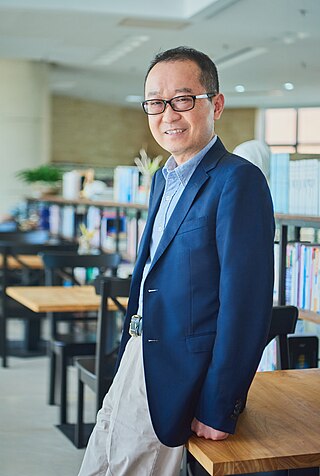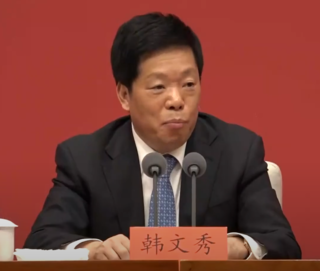Biography and academic career
Yu was born in Nanjing in November 1948 in a family with ancestry from Taishan, Guangdong. He graduated from Beijing Steel and Iron Institute in 1969, received an MA in economics from the Graduate School of Chinese Academy of Social Sciences in 1983, and a D.Phil. in economics from Oxford in 1994. [2]
He worked at Beijing Heavy Machinery Factory (北京第二通用机械厂) from 1969 to 1979. [3] In 1979 he joined the Institute for World Economics and Politics (IWEP) at the Chinese Academy of Social Sciences (CASS) where he worked for three decades; he remains an Academician of CASS. At IWEP he was a Junior Fellow (1979-1983), Research Fellow (1983-1987), and Senior Research Fellow (from 1987); head of the Department of Western Economic Theory from 1986 to 1988; [3] and the Institute's Director for over a decade from 1998 to 2009. [4]
From 2003 to 2011 he was President of the China Society of World Economy [2] and Editor-in-Chief of the journal China and World Economy. [5] He has also been Editor-in-Chief of The World Economy and of the International Review of Economics. [3] He is the winner of the 2000-2005 Sun Yefang Prize in Economics. [3]
The Sino-Japanese Journalist Exchange Agreement is a term that collectively refers to several agreements for a journalist exchange between China and Japan.

Zhang Jun is a Chinese economist and currently serves as Dean of School of Economics at Fudan University in Shanghai.

Beijing Economic-Technological Development Area (BETDA) is a state-level economic and technological development zone in Beijing, China. The area is developed by Beijing ETOWN, an economic development and investment initiative of the Beijing municipal government.

Fan Gang is one of China's most prominent economists and one of China's most active reform advocates. He is currently based in Beijing, serving as a professor at the Graduate School of Chinese Academy of Social Sciences (CASS) and at the Peking University HSBC Business School, as well as the director of China's National Economic Research Institute (NERI). He is also the Secretary-General of the China Reform Foundation.
Ji Guoxing (季国兴) is a Chinese academic, author, political scientist and professor at Shanghai Jiaotong University.
The Summer Palace Dialogue (SPD) is an economic forum which brings together economists from both China and the United States to discuss economic cooperation between the two largest economies in the world. SPD is co-hosted by Chinese Economists 50 Forum and the Columbia Global Centers East Asia, and was formerly co-hosted by the Brookings Institution. It was founded in 2009 by former Vice Chairman of the Joint Chiefs of Staff and current Chairman of AEA Investors Admiral Bill Owens and Vice Minister Liu He of the Chinese Central Leading Group on Financial and Economic Affairs. The forum extends for two days. Participants spend the first day in private discussions and then convene a half-day public session to summarize their observations, analyses, and conclusions with the press and a broader audience. The Summer Palace Dialogue is scheduled annually in mid-September in Beijing, right before the Summer World Economic Forum in Dalian. The third annual Summer Palace Dialogue was held on September 12–13, 2011.
Du Runsheng was a Chinese military officer, revolutionary leader, politician, and economist. He has been hailed as "China's father of rural reform". From 1982 to 1986, he drew up the annual "Document No.1 of the Central Government" about rural reform, which promoted the development of rural areas. Du's students included Wang Qishan, Justin Yifu Lin, Zhou Qiren, Wen Tiejun, Wang Xiaoqiang, Chen Xiwen, Zhang Musheng, Du Ying and Weng Yongxi.
Dr. Guo Peiyuan, who holds a Ph.D. in Management from Tsinghua University, is the general manager of SynTao and chairman of SynTao Green Finance. Dr. Guo Peiyuan continuously focuses on research and practices about corporate social responsibility (CSR) and socially responsible investment (SRI), with abundant experience on research, training and consulting services.

Nankai Institute of Economics is an economic research institute affiliated to the Nankai University School of Economics. It is located within the university's Balitai campus at Nankai District, Tianjin. The institute was founded in 1927 by He Lian and Zhang Boling, was originally named Nankai Committee of Sociology and Economics. It changed its name into Nankai Institute of Economics in 1931, and then established the tenet of the institute, which is to "know China and serve China". The systematic social research that the institute has conducted was ahead of its time in China. The Nankai Price Index, compiled in 1927, was the very first price index in China and the most important reference to the study of Chinese economy during that time, indicating that it was rather influential and of high academic value. The institute was then regarded as the authority of Chinese economic studies during the period of Republic of China (1912–1949).

Xie Zifen is a retired Chinese rural economist and senior research fellow with the Shanghai Academy of Social Sciences (SASS).

Jiang Xiaojuan is a Chinese economist and politician. She is a Professor and Dean of the School of Public Policy and Management of Tsinghua University, and a research professor at the Chinese Academy of Social Sciences (CASS). She is a Standing Committee Member of the National People's Congress (NPC) and Vice Chairperson of the NPC Social Construction Committee, taking charge of lawmaking, revision, enforcement, and supervision of social insurance, sports, protection of women's and children's rights and others. She was elected President of the Chinese Public Administration Society in 2019.
Lanrui Feng is a well known Chinese economist born in Guiyang, Guizhou, China. As a member of the Chinese Communist Party, Lanrui Feng used to be the chief editor of Shanghai Youth Daily, editorial committee of the China Youth Daily, and the fellow of Institute of Marxism-Leninism and Mao Zedong Thought, Chinese Academy of Social Sciences. She has been included on the Who's a Who multiple times on various versions globally and has been called by media "a successful Chinese lady".
Domestic-international dual circulation is a Chinese government strategy to reorient the country's economy by prioritizing domestic consumption while remaining open to international trade and investment. The first academic study on dual circulation defined it as "the domestic consumption-driven economic rebalancing to achieve sustainable economic development".
Zhao Qizheng is a retired Chinese engineer and politician. Previously he served as director of the State Council Information Office and director of the Foreign Affairs Committee of the National Committee of the Chinese People's Political Consultative Conference. He was a member of the 16th Central Committee of the Communist Party of China. He was a member of 10th National Committee of the Chinese People's Political Consultative Conference and a member of the 11th Standing Committee of the Chinese People's Political Consultative Conference.

Zhijiang Xinyu is a book written by Xi Jinping, then the party secretary of Zhejiang Province using the pen name "Zhexin". It was initially a personal column about political ideas published on the front page of Zhejiang Daily from 25 February 2003, to 25 March 2007. Xi published 232 essays in this column. In August 2007, these essays were published in a book also titled Zhijiang Xinyu in chronological order. The name of this book's English edition first published in 2019 is Zhejiang, China: A New Version for Development.
Wang Luolin is a Chinese economist, educator and politician who served as party secretary of Xiamen University between 1989 and 1994.
Gui Shiyong was a Chinese economist and politician who served as director of the State Council Research Office from 1998 to 2001.
Wen Tiejun is a Chinese agricultural economist who is a professor at the Renmin University of China.

Ronghua Subdistrict is a subdistrict located on the north of Daxing District, Beijing, China. It is within and under the administration of Beijing Economic-Technological Development Area. Ronghua borders Shibalidian Township and an exclave of Yizhuang Town to the north, Taihu and Majuqiao Towns to the east, Boxing Subdistrict to the south, and Yizhuang Town to the west. The name Ronghua literally translates to "Glory".

Han Wenxiu is a Chinese economist and politician, currently serving as executive deputy director of the Central Financial Leading Group Office.









